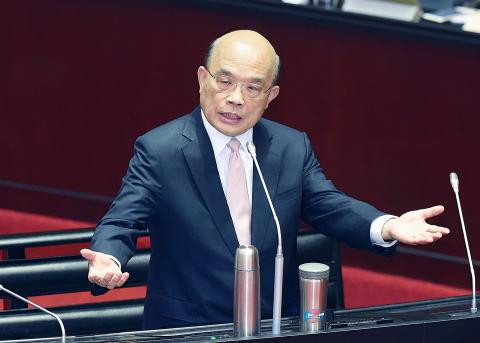“Kneeling before China and begging for mercy” would not make Taiwan better, Premier Su Tseng-chang (蘇貞昌) told lawmakers yesterday after one legislator asked him to respond to Taipei Mayor Ko Wen-je’s (柯文哲) criticism that cross-strait relations are at their worst in 30 years.
Despite the government’s efforts to extend goodwill, China has not renounced the use of force on Taiwan and is stepping up efforts to impose its “one country, two systems” framework on the nation, he said.
To safeguard Taiwan’s existence and protect its sovereignty and democracy, the government cannot comply with Chinese President Xi Jinping’s (習近平) proposals, he said, referring to Xi’s Jan. 2 speech warning that unification must be the ultimate goal of any talks between Taipei and Beijing.

Photo: Liao Chen-huei, Taipei Times
“If this has been said to be bad, we still have to hold the line,” the premier said.
Perhaps the best way to improve cross-strait relations would be “kneel down and give Taiwan to China,” Democratic Progressive Party (DPP) Legislator Cheng Pao-ching (鄭寶清) joked.
Nothing good would come of doing so, Su replied, citing the protests in Hong Kong.
“Look at what has become of Hong Kong after it was unified with China … from prosperity to turmoil,” he said.
“China promised it that nothing would change for 50 years [after Hong Kong’s handover in 1997]. Now, everything has been changed, just 20 years later,” he said.
Using a Chinese-language idiom, Su said “bowing and kneeling” to China would not make Taiwan any better.
Earlier in the day, when asked by DPP Legislator Lu Sun-ling (呂孫綾) about Chinese students and tourists vandalizing “Lennon walls” in Taiwan that support Hong Kong’s pro-democracy protests, Su said: “If they come here to commit a crime, we would immediately apprehend, investigate and deport them. This would serve them right.”
“We do not allow people living under Chinese autocracy to come here and not learn mutual respect from our democratic society, and to do something illegal to our democratic walls,” the premier said.
“Not only do we not welcome them, we will not allow them to be here,” he added.
In related news, President Tsai Ing-wen (蔡英文) told reporters who asked her about Ko’s comment that when it comes to cross-strait relations, it is not a question of good or bad, but an issue of national interests.
Her administration has adopted a rational stance toward cross-strait relations, as it has not provoked, nor made any rash moves, in the face of China’s constant encroachment, she said.
The government has been defending national interests and maintained normal interactions across the Taiwan Strait, while China chose to use its tourists visiting Taiwan for political purposes, she said.
Every government prioritizes its national interests when instituting policies and that is especially true for cross-strait relations, Tsai added.
Additional reporting by Lin Chia-nan

Palauan President Surangel Whipps Jr arrived in Taiwan last night to kick off his first visit to the country since beginning his second term earlier this year. After arriving at Taoyuan International Airport at around 6:30 pm, Whipps and his delegation were welcomed by Minister of Foreign Affairs Lin Chia-lung (林佳龍). Speaking to gathered media, the Palauan leader said he was excited and honored to be back in Taiwan on his first state visit to Taiwan since he was sworn in this January. Among those traveling with Whipps is Minister of State Gustav N. Aitaro, Public Infrastructure

President William Lai (賴清德) yesterday thanked Palau for its continued support of Taiwan's international participation, as Taipei was once again excluded from the World Health Assembly (WHA) currently taking place in Switzerland. "Palau has never stopped voicing support for Taiwan" in the UN General Assembly, the WHO and other UN-affiliated agencies, Lai said during a bilateral meeting with visiting Palau President Surangel Whipps Jr. "We have been profoundly touched by these endorsements," Lai said, praising the Pacific island nation's firm support as "courageous." Lai's remarks came as Taiwan was excluded for the ninth consecutive year from the WHA, which is being held in

RESOLUTIONS DEBATE: Taiwan’s allies said that UN and WHA resolutions cited by China and other nations ‘do not determine Taiwan’s participation in WHO activities’ A proposal to invite Taiwan to this year’s World Health Assembly (WHA) was rejected on Monday, resulting in Taipei’s absence from the annual meeting for a ninth consecutive year, although partners spoke up for Taiwan’s participation at the first day of the meeting. The first agenda item after the opening was a “two-on-two debate” on a proposal to invite Taiwan to participate at the WHA as an observer. Similar to previous years, two countries made statements in favor of the proposal, while two others expressed their opposition. Philippine Secretary of Health Teodoro Herbosa, president of the 78th WHA, accepted the WHA General Committee’s

At least three people died and more than a dozen were injured yesterday afternoon when a vehicle struck a group of pedestrians in New Taipei City’s Sansia District (三峽). The incident happened at about 4pm when a car rammed into pedestrians at an intersection near Bei Da Elementary School. Witnesses said the sedan, being driven at a high speed, ran a red light, knocking scooters out of the way and hitting students crossing the road before careening into a median near the intersection of Guocheng and Guoguang streets. The incident resulted in three deaths and 13 injuries, including the driver, a 78-year-old man